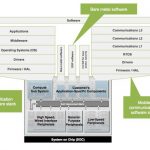There is an interesting reality show playing in the media featuring Qualcomm and Samsung with supporting actors TSMC, LG, Xaomi, and Apple. As I’m sure we all have read, Samsung is losing massive amounts of money on mobile which was once a very profitable business unit. Let’s take a look at the current landscape and some of the recent… Read More
Tag: soc
An Approach to Top-Down SoC Verification
We’ve blogged dozens of times about UVM– Universal Verification Methodology at SemiWiki, and all of the major EDA vendors support UVM, so you may be lulled into thinking that UVM is totally adequate for top-down SoC verification. Yesterday I had a phone discussion with Frank Schirrmeister of Cadence about a new approach… Read More
ASIC Days Are Here Again
Technology often goes in cycles. Thirty years ago the dominant mode of computing was a shared computing resource with comparatively dumb terminals. Think of a Vax accessed by terminals. Then workstations and the PC came along and the dominant mode became a computer on everyone’s desk. Then the smartphone came along and … Read More
Expert Tool to Easily Debug RTL and Reuse in SoCs
SoC design these days has become a complex and tricky phenomenon involving integration of multiple IPs and legacy RTL code which could be in different languages, sourced from various third parties across the globe. Understanding and reusing RTL code is imperative in SoC integration which needs capable tools that can accommodate… Read More
NoC IP boosts SoC reliability, fault tolerance
System-on-chip (SoC) devices are increasingly becoming more complex in terms of adding functionality yet they need to be more reliable and fault tolerant for automotive, aerospace and industrial electronics.
Arteris Inc.—which invented the network-on-chip (NoC) interconnect technology back in 2006—is now offering FlexNoC… Read More
Filling the Gap between Design Planning & Implementation
As every other person is talking about IoT today, Michael Munsey of Dassault Systemes looks at this trend in the context of critical success factors and Dassault’s strategy towards providing semiconductor solution that integrates the design chain and continues to keep the semiconductor eco-system healthy and profitable. … Read More
Xilinx Boards Make a Great Christmas Gift!
Ok, first thing first, Happy Thanksgiving! For the Miller’s as I get older, it is new traditions as some old ones have passed on. Memories are great and new ones to make. So you know the great debate right?
These poor people working Thanksgiving to sell some tablet or smart phone to save a few bucks. Those that must work, my condolences… Read More
HLS Tools Coming into Limelight!
For about a decade I am looking forward to seeing more of system level design and verification including high level synthesis (HLS), virtual prototyping, and system modeling etc. to come in the main stream of SoC design. Although the progress has been slow, I see it accelerating as more and more tools address the typical pain points… Read More
Xilinx UltraFast Design Methodology Guide will save you time and money
Well today, i’m easing my way back in from vacation. Took a camper, 6 kids, 1 wife with bun in the oven and saw the great USA. 17 States, roughly 5500 miles. It was great fun and tiring at the same time. The Grand Canyon was a blessing but I really enjoyed the ‘The Four Corners‘ where UT, CO, NM, AZ all meet. I had each kid… Read More
A Complete Scalable Solution for IP Signoff
In an SoC world driven by IP, where an SoC can have hundreds of IP (sourced not only from 3[SUP]rd[/SUP] party but also from internal business units which can have a lot of legacy) integrated together, it has become essential to have a comprehensive and standard method to verify and signoff the IP. Additionally, these checks must … Read More




